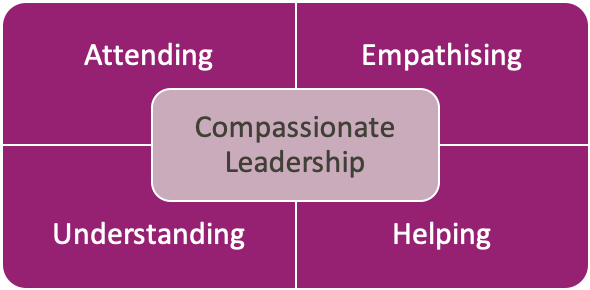During times of global crisis, such as the unprecedented COVID-19 outbreak, it is particularly important to ensure that there is a culture of support in the NHS. Compassion and care must be a certainty for employees at a time of great uncertainty. Compassionate care is shown to be beneficial for patient health outcomes including reduced mortality and malpractice complaints and increased satisfaction with care [1]. However, it is equally important that we show compassion to our colleagues, as they are the ones who will need to manage an increasing burden of responsibility.
Compassionate leadership involves responding to your colleagues with kindness and acknowledging their concerns or worries. Even the smallest acts of compassion can have a positive impact. Not only does compassion benefit the recipient but it also benefits anyone witnesses and this knock-on effect has positive benefits on the organisational culture, helping to create a caring and supportive environment.
The 4 components of compassionate leadership [2]:

Attending – “I pay attention to others and how they are feeling”
Attending to how your colleagues are feeling is particularly important at a time of crisis. A compassionate leader will ensure that they listen to the challenges, difficulties and problems their colleagues are facing, even if time is limited. To do this effectively, you must first pay attention and actively listen with an open mind in order to learn and gain new insight into how they are feeling. You must ensure that you withhold judgement and aim to develop an empathetic connection with your colleague. Next, it is important that you then clarify, summarise and reflect on what you have heard in order to show that you listened and understood what was said. Finally, a compassionate leader may then share their own thoughts or concerns about the situation. A compassionate leader is someone who promotes psychological safety; colleagues can safely speak up about problems or uncertainties without fear of being ignored or reprimanded. Leaders should also know their colleagues well, so they notice any changes in their behaviour and check-in with them if so.
Understanding – “I understand why an individual is feeling distressed”
In order to show compassion, a leader must work with their colleagues to understand their feelings and emotions. If your colleagues are able to explore their emotions with someone, then they are more likely to make sense out of the situation and start thinking of effective ways to resolve them. Additionally, helping your colleagues to understand their feelings will help you to appraise the situation and understand why they may be feeling that way. Coaching techniques are also beneficial to help colleagues to develop increased self-awareness and self-efficacy which is especially important at a time where there will be feelings of disempowerment and fear [3,4]. These can include:
GROW Model:
- Goal: The individual’s goal which they want to accomplish. It should be defined as clearly as possible.
- Reality: That’s the status quo, where the individual is right now. They describe their current situation and how away they are from their goal.
- Obstacles and Options: What are the obstacles (roadblocks) that keep the individual from achieving the goal? Once identified, help them find ways to overcome them (the options).
- Way forward: Convert the options into action steps to accomplish the goal.
Positive coaching:
- You ask your colleague a miracle question i.e. What would it be like if they had achieved what they are concerned about? This technique encourages the use of positive imagination to visualise what is truly desired. Ask your colleagues the following questions:
- On this perfect day…
- How do you feel after waking up?
- What are you doing?
- How do you feel as the day goes on?
- Now work backwards to see the steps that they will have to have taken to achieve this.
Empathising – “I empathise with others who are in distress”
As leaders are typically in a similar environment to the colleagues they manage, they may often be feeling similar emotions or have felt the same emotions. It means they will be able to empathise better and engage in an effective discussion about the issues which can be helpful. Feeling understood and valued by a leader is associated with increased engagement at work [5]. Leaders need to reassure colleagues that everyone is in this together. Feelings of fear and anxiety are normal responses to the pandemic and these emotions are likely to be felt by everyone at this current time.
Helping – “I take thoughtful, intelligent and appropriate action to help relieve an individual’s suffering”
Compassionate leaders are individuals who are willing to offer help to their colleagues. This goes beyond the management role that they take with their colleagues as part of their job description. You must be driven to take thoughtful and caring action to benefit others. It does not necessarily mean that you must fix the problems for those you lead but instead, you may help your colleagues to find appropriate solutions. For example, you could help support them with their tasks by providing appropriate resources, giving them more time or helping colleagues evaluate their best options and strategies moving forward. Albeit in the current situation, the latter is likely to be most suitable. Ultimately, a compassionate leader will become a role model and create a higher standard of compassion and care which other people are then likely to observe and imitate.
Compassionate Leadership in Health and Social Care
Each of the four steps are really important to increase the prevalence of compassionate leadership within the NHS. It is times like these when it is really important to come together and support one another. If everyone shows compassionate leadership in a team this will increase camaraderie and feelings of support which is really important, particularly at times of high stress and uncertainty. Ultimately, a compassionate approach to supporting colleagues may be vital in order for them to remain brave in the face of the challenges they face.
References:
- Decety, J., & Fotopoulou, A. (2015). Why empathy has a beneficial impact on others in medicine: unifying theories. Frontiers in behavioral neuroscience, 8, 457.
- Atkins, P. W., & Parker, S. K. (2012). Understanding individual compassion in organizations: The role of appraisals and psychological flexibility. Academy of Management Review, 37(4), 524-546.
- Ting, S., & Scisco, P. (2012). The CCL handbook of coaching: A guide for the leader coach(Vol. 30). John Wiley & Sons.
- Strauss, K., Griffin, M. A., & Rafferty, A. E. (2009). Proactivity directed toward the team and organization: The role of leadership, commitment and role‐breadth self‐efficacy. British Journal of Management, 20(3), 279-291.
- West, M. A., & Richter, A. W. (2008). Climates and cultures for innovation and creativity at work. Handbook of organizational creativity, 211-236.

Hannah Evans
Hannah is an Assistant Business Psychologist at Impact Consulting Psychologists Ltd with an MSc in Organisational Psychology from The University of Manchester (BPS accredited). She gained a solid theoretical understanding and practical skills in training and development, personnel selection and assessment, organisational psychology and leadership development. Her research investigated the effect of personal and
organisational ethical values on the practice of ethical leadership of managers
in the NHS. She has written articles about leadership and its impact on
organisations.
I have read and understood the BMJ Group policy on declaration of interests and declare the following interests: none.